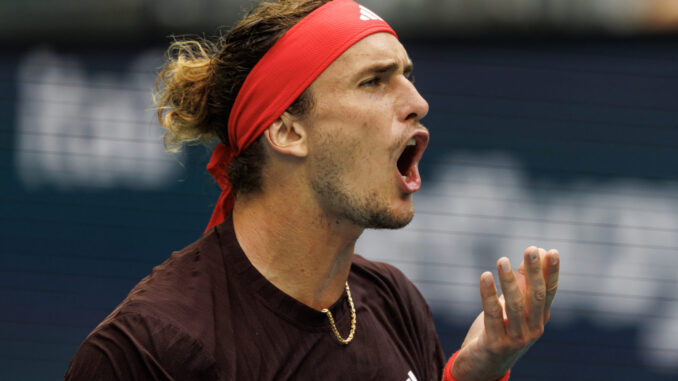
Alexander Zverev, the towering German tennis star ranked No. 2 in the world, stood at a crossroads as he exited the Miami Open on March 26, 2025, his latest stumble in a string of frustrating defeats. The top seed, a perennial contender with a game built on a booming serve and relentless baseline play, fell in the fourth round to France’s Arthur Fils, a rising talent who turned the tables with a 3-6, 6-3, 6-4 victory. The loss, which unfolded under the bright lights of Hard Rock Stadium, marked yet another chapter in a perplexing saga for Zverev—one he candidly admitted has plagued him across his last four tournaments. As the 27-year-old packed up his racquets and faced the press, his words revealed a player grappling with a recurring nightmare: losing matches he feels destined to win.
The Miami Open had started with promise for Zverev. After a shaky 2025 season that saw him kick off with a runner-up finish at the Australian Open, only to falter in subsequent events, he arrived in Florida determined to turn the tide. “Miami is my favorite city in the United States,” he’d said earlier in the week, his affection for the place tied to its fast courts and vibrant energy—conditions he believed suited his style. He’d cruised into the fourth round, dispatching Jacob Fearnley and Jordan Thompson with a blend of power and poise that hinted at a resurgence. Against Thompson, he’d rallied from a 1-4 deficit in the first set to win 7-5, 6-4, a performance that left him optimistic. “I’m happy with my level from 1-4 onwards,” he’d noted, savoring the taste of control.
But against Fils, that control slipped away. The match began with Zverev asserting dominance, taking the first set 6-3 as his serve hummed and his groundstrokes found their mark. Then, the tide turned. Fils, battling back pain but fueled by youthful grit, dialed up his aggression, forcing Zverev into longer rallies and exposing cracks in his armor. By the third set, the German was on the ropes, and a late break sealed his fate. “I have been losing a lot of matches where I feel like I am in control lately,” Zverev confessed afterward, his voice heavy with frustration. It’s a sentiment that’s haunted him since Melbourne, where Jannik Sinner outlasted him in the final, and it’s followed him through South America, Mexico, and now Miami.
This isn’t a new script for Zverev. In Buenos Aires and Rio, he bowed out in the quarterfinals, undone by opponents who capitalized on his mid-match lapses. In Acapulco, a second-round exit stung even deeper, and at Indian Wells, a first-round loss to Tallon Griekspoor left him reeling. “I don’t know right now,” he admitted when pressed on the root of this persistent problem, his uncertainty palpable. For a player with six Masters 1000 titles and a career-high ranking of No. 2, the inability to close out winnable matches is a riddle he’s desperate to solve. “I will have a conversation with the people around me,” he added, signaling a search for answers that’s as much about strategy as it is about soul-searching.
The timing couldn’t be more critical. With Sinner sidelined by a three-month doping suspension until May, the race for the No. 1 ranking is wide open—a golden opportunity Zverev had hoped to seize. “It was in the beginning,” he’d said of his top-ranking ambitions after Indian Wells, only to temper that dream with a grim reality: “Now it’s less, because I’m just playing terrible.” In Miami, where he reached the final in 2018 and the semifinals in 2024, he saw a chance to regain momentum. Instead, Fils—a 20-year-old with a fearless streak—delivered the latest blow, leaving Zverev to ponder why his game unravels when victory seems within reach.
Zverev’s 2025 season, now at 13-6, tells a tale of two halves. The Australian Open showcased his brilliance, a deep run that reaffirmed his elite status. But since then, he’s managed just one victory per tournament across his last five outings, a stark contrast to the consistency that once defined him. Against Fils, his serve—typically a weapon—held firm early, but his decision-making faltered as the match wore on. “I had to find a rhythm, be more aggressive,” Fils said of his own turnaround, a blueprint Zverev couldn’t counter. The German’s 145 Masters 1000 wins, a record for his countrymen, feel like a distant echo when set against this recent string of disappointments.
As the tour shifts to clay, Zverev faces a pivotal moment. His past successes on the surface—titles in Rome and Madrid—offer hope, but the mental hurdle looms large. “I hope I can turn it around,” he’d said before Miami, clinging to the belief that better days lie ahead. For now, though, the tennis world watches a champion in crisis, a player whose talent is undeniable yet whose grip on victory keeps slipping. Fils moves on to the quarterfinals, while Zverev heads home, left to dissect a problem that’s as maddening as it is mysterious—one he knows he must conquer to reclaim his place among the sport’s elite.
Leave a Reply